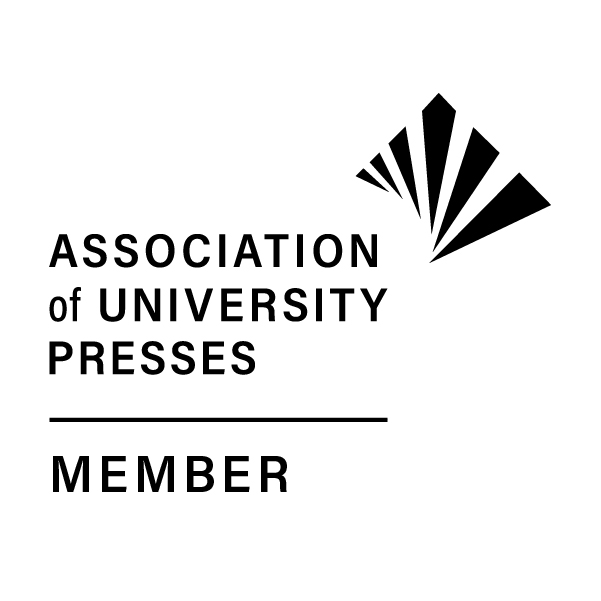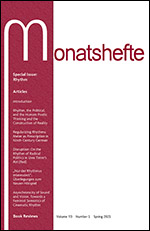
|
|
MonatshefteVolume 109, Number 4, Winter 2017Table of Contents
ARTICLES Todd Kontje Schiller’s Wilhelm Tell: Weimar Classicism between Empire and Nation In this essay I explore ways in which Schiller’s Wilhelm Tell responds to the paradigm shift in European politics from the Holy Roman Empire to the modern nation-state. Rather than clinging to the imperial politics of the past or embracing unequivocally the new model of the egalitarian nation-state, Schiller explores the advantages and disadvantages of both. Schiller stages a conflict between local Swiss cantons and the Habsburg-controlled Austrian territory. This historical opposition, in turn, makes implicit reference to the recent French efforts to control and centralize the Swiss government, as well as intra-German tensions between smaller principalities and larger territorial states. The larger purpose of the essay is to reconsider the cultural politics of Weimar Classicism in ways that subvert the teleological model of the “Klassik-Legende.” (TK)
Marlo Alexandra Burks Hofmannsthal’s Augenblicke in Griechenland is rarely treated in its entirety to a close reading; usually specific aspects of the text are used to support a broader interpretation of Hofmannsthal’s work, or of fin-de-siècle views on the Augenblick. With this article, I take the theme of encounters to demonstrate the complexity of the text on a primarily aesthetic level: its internal echoes, its modification of themes, its arc. The text culminates in an encounter with otherness made manifest in the faces of archaic Greek statues. Exploring encounters with the gaze of the other, we can see the text’s relevance to theorizing the encounter generally, and the aesthetic encounter in particular. This leads me to posit a ‘dialogical aesthetics’ at work in Hofmannsthal’s text, bringing him into conversation with thinkers like Martin Buber, while offering a counterargument to philosophical skepticism towards art, as argued for perhaps most vehemently by Levinas. (MLB)
Michael L. Koch Reinvigorating Albert Ehrenstein’s Tubutsch through Nietzsche’s “Eternal Return of the Same” Albert Ehrenstein was widely published in the early 20th century but is now read so rarely as to be considered one of Austria’s “forgotten” literary figures. His early prose work Tubutsch comprises a justifiably popular exception thanks to its remarkable proto-existentialist undertones. Like many writers classified as “Expressionist,” Ehrenstein’s works reveal some signs of Nietzsche’s influence. Indeed, Ehrenstein appears to make a direct reference to the “eternal return of the same,” Nietzsche’s difficult “thought of thoughts,” in Tubutsch. Ehrenstein’s indirect and seemingly discursive, even humorous, approach to the “ewige Wiederkehr des Gleichen” might offer an alternative to dealing with troublesome philosophical matters like Nietzsche’s. Language has limitations when attempting to describe explicitly such cogitations, and when the “ewige Wiederkehr“ is mentioned in Tubutsch, Ehrenstein implicitly suggests that some mediation is required to communicate the “thought of thoughts”—such as metaphors, intoxication, questioning, humor, and/or non-verbal, visual arts. (MLK)
Reinhard Andress In his new novel, Das Komplott zu Lima (The Lima Conspiracy), the German-Argentinian author Roberto Schopflocher works with the tools of literature and fictionalized family history to recreate the atmosphere surrounding the famous auto de fé of 1639 in Lima, Peru. Implied connections to our times result that lie in the tragic continuity of historical events, above all in the bureaucratization of racist thinking. After tracing the historical background of the novel, this article explores the literary tools Schopflocher employs and compares the novel to Alfonso Toro’s La Familia Carvajal. In a further step, the article establishes the novel’s relevance for our times with the help of Hannah Arendt’s Origins of Totalitarianism and Irene Silverblatt’s engagement with her “subterranean stream” of history. We ultimately see that Schopflocher is a considerable sceptic when it comes to the development of history. (RA; in German)
Emina Mušanović Nosferatu’s Horror: Early Cinema’s Fugitive Shadows This article investigates technologies of the monstrous at work in Murnau’s Nosferatu: A Symphony of Horror (1922) in a backward glance, by departing from the figure of Nosferatu stripped of its horror in digital memes and a SpongeBob episode. In these contemporary revivals, the terror experienced from the foreignness of the vampire’s exteriority, the infectious effacement of discernible origin and kinship, and transgression against various binaries and boundaries no longer registers. The departure from a Nosferatu freed from his frightfulness and set loose in new media facilitates a critical investigation of the horrors of the monstrous Other and the monstrosity of the filmic medium that intersect within this apparition. In other words, this essay examines the conventions through which Graf Orlok is fashioned as a monstrously human Other and the horror of the encounter with the vampire’s posthuman embodiment of the filmic medium. (EM)
REVIEW ARTICLE Peter Krapp What Does Literary Knowledge Look Like? (Urs Büttner, Mario Gotterbarm, Frederick Schneeweiss, Stefanie Seidel und Marc Seiffarth, Hrsg., Diesseits des Virtuellen. Handschrift im 20. und 21. Jahrhundert, 2015.—Christine Lubkoll und Claudia Öhlschläger, Hrsg., Schreibszenen. Kulturpraxis – Poetologie – Theatralität, 2015.—Christian Benne, Die Erfindung des Manuskripts. Zur Theorie und Geschichte literarischer Gegenständlichkeit, 2015.—Christian A. Bachmann, Laura Emans und Monika Schmitz-Emans, Hrsg., Bewegungsbücher. Spielformen, Poetiken, Konstellationen, 2016.—Christoph Benjamin Schulz, Poetiken des Blätterns, 2015.—Jens Löscher, Schreiben. Literarische und wissenschaftliche Innovation bei Lichtenberg, Jean Paul, Goethe, 2014.)
PERSONALIA Introduction, German Departments in the USA, German Departments in Canada, Promotions, New Appointments, Visitors, Retirements, Necrology, Doctoral Dissertations, Summary
BOOK REVIEWS Albrecht, Andrea, Lutz Danneberg, Olav Krämer und Carlos Spoerhase, Hrsg., Theorien, Methoden und Praktiken des Interpretierens (Carsten Dutt) Allert, Beate, ed., J.G. Herder: From Cognition to Cultural Science/Von der Erkenntnis zur Kulturwissenschaft (Eva Piirimäe) Ammon, Ulrich, Die Stellung der deutschen Sprache in der Welt (Mark L. Louden) Aurnhammer, Achim und Thorsten Fitzon, Hrsg., Lyrische Trauernarrative. Erzählte Verlusterfahrung in autofiktionalen Gedichtzyklen (Paul Gebhardt) Bachmann, Christian A., Metamedialität und Materialität im Comic. Zeitungscomic – Comicheft – Comicbuch (Rüdiger Singer) Bertram, Georg W., Kunst als menschliche Praxis. Eine Ästhetik (Alex Holznienkemper) Biermann, Wolf, Warte nicht auf bessre Zeiten! Die Autobiographie (Frederick A. Lubich) Daffner, Carola and Beth A. Muellner, eds., German Women Writers and the Spatial Turn: New Perspectives (Valerie Heffernan) Deutsch-Schreiner, Evelyn, Theaterdramaturgien von der Aufklärung bis zur Gegenwart (Katharina Pewny) Fuchs, Anne and J.J. Long, eds., Time in German Literature and Culture, 1900–2015: Between Acceleration and Slowness (Simone Pfleger) Gjesdal, Kristin, Herder’s Hermeneutics. History, Poetry, Enlightenment (Ulrike Wagner) Hall, Katharina, ed., Crime Fiction in German: Der Krimi (Julia Karolle-Berg) Hilmes, Carola und Ilse Nagelschmidt, Hrsg., Christa Wolf Handbuch. Leben – Werk – Wirkung (Sonja E. Klocke) Kónya-Jobs, Nathalie, Räume in Günter Grass’ Prosa (Monika Shafi) Krumrey, Birgitta, Der Autor in seinem Text. Autofiktion in der deutschsprachigen Gegenwartsliteratur als (post-)postmodernes Phänomen (Jerker Spits) Lehman, Robert S., Impossible Modernism: T.S. Eliot, Walter Benjamin, and the Critique of Historical Reason (Marcus Bullock) Schmid, Marcel, Autopoiesis und Literatur. Die kurze Geschichte eines endlosen Verfahrens (Bryan Klausmeyer) Scholz, Anna-Lena, Kleist/Kafka. Diskursgeschichte einer Konstellation (Andreas Härter)
INDEX VOLUME 109 (2017) |

